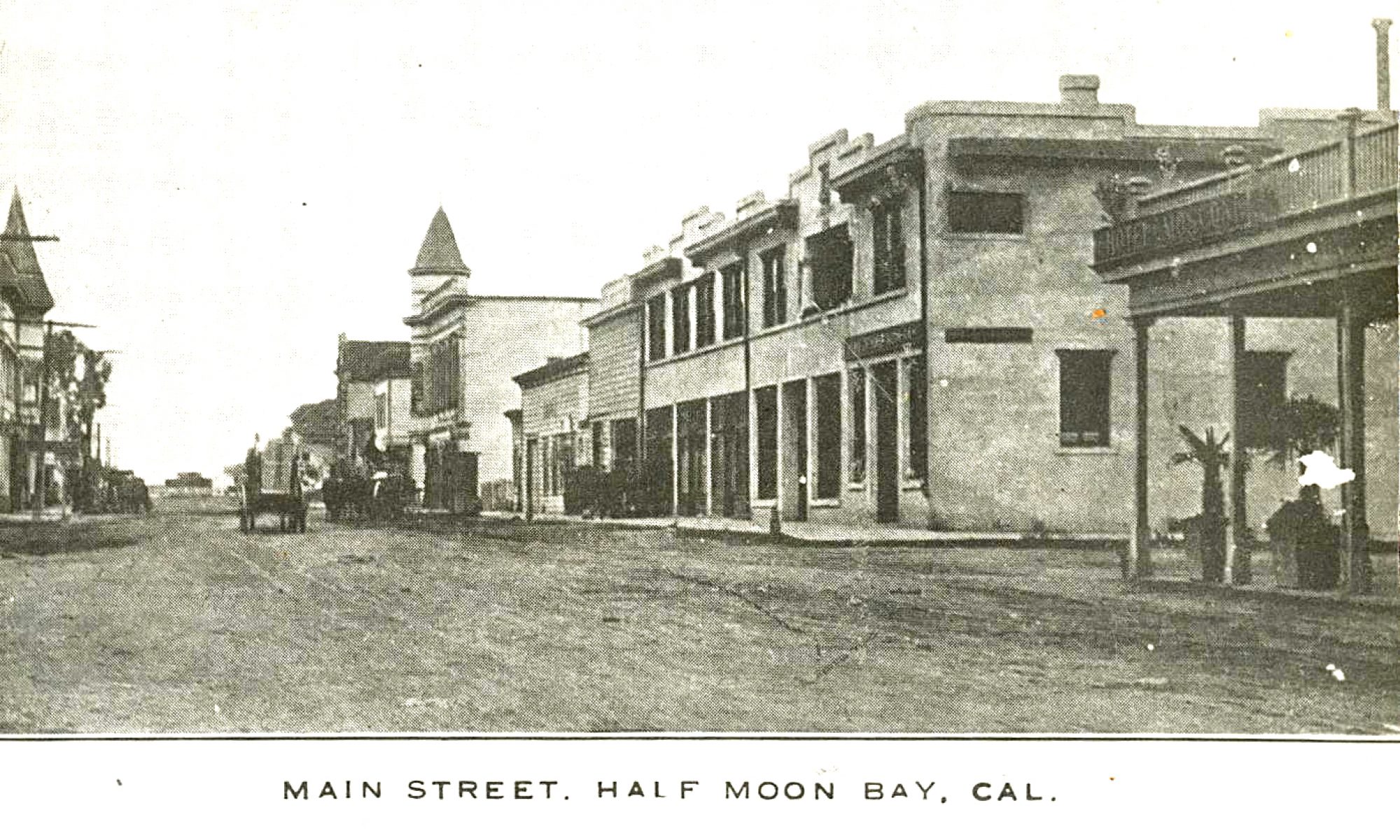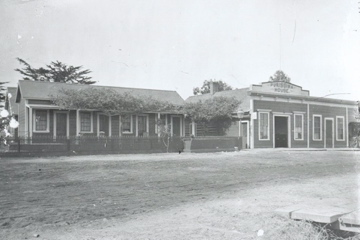(Old buildings in Purisima–now gone.)
By June Morrall
(Written in 1977, using the resources at the San Mateo County History Museum)
By the age of 16, Henry Dobbel launched his ambitious climb to the top. That year, about 1845, he ran away from his home in Germany, to seek an adventurous life at sea.
The self-confident youth worked at odd jobs, willing to do anything, earning the respect of everyone around him. All the while, in the back of his mind, Henry knew a rich, full life lay ahead. Sailing around the Cape Horn, he landed in California months before the Gold Rush.
Again, in the Golden State, he performed all kinds of work, including hauling freight between the Amador minds and Sacramento. But soon Dobbel’s enterprising mind inspired him to switch occupations as he used an imported waffle iron to run a successful San Francisco restaurant.
He met and married fellow German Margaret Roverkampf-Schroeder. She arrived in California via the mosquito-infested trip across the Isthmus of Panama on muleback. The couple settled on a large farm in the East Bay.
In the 1860s Henry learned of the opportunities at the bustling new village of Purissima, sold his farm, and bought a thousand acres from John Purcell. The Dobbels became one of, or the largest landowners with dreams, perhaps, of being the biggest fish in a tiny pond.
Henry and Margaret built a big house on the south bank of the creek. Carpenters came from San Francisco and stayed for six months to construct the two-story, 17-room imposing building. There were all sorts of civilized conveniences, including running water in the rooms [established via a hydraulic “ram” placed in the creek to pump up the water.] Ever the inventor, Dobbel figured out how to install gas lighting in his new home.
The Dobbel’s created a true “Coastside mansion” with a ballroom covered with carpets imported from New York and Europe. Their dreams of grandeur extended to the gardens where colorful flowers and shrubs surrounded an elegant water fountain.
At all times two vicious mastiffs guarded the house and the valuables inside–as an additional precaution, the Dobbel’s personal police force patrolled the extensive grounds dotted with a smokehouse, gas house, barns and other outbuildings.
The Dobbel’s working ranch employed 50 men who planted and harvested wheat and barley, and potatoes, the mainstay of the area.
My impression is that the Dobbel’s wanted Purissima to be their personal fiefdom, which may not have been that unusual at the time. Consider the many grandiose mansions on the other side of the mountain. Without taxes to pay, it was possible to pursue a lifestyle that was diminished after 1913 when the Income Tax law went into effect.
The Dobbel’s employed schoolteacher Mary Bradley who lived with them. But the local children who attended school only in spring, summer and fall, failed to learn their lessons in winter, when the muddy roads prevented them from reaching the little schoolhouse.
A journalist passing through Purissima in 1871, noted impressive improvements, some financed by Henry Dobbel. The growing town consisted of a wagon, harness and shoemaker shop and Richard Dougherty’s well known Purissima House. Dougherty was the hotel’s host as well as the town’s postmaster where the stage stopped every day.
Half a dozen carpenters worked feverishly to finish the new general store, owned by the Husing brothers of San Mateo. Inside groceries, boots, liquor and cigars were sold. The sign outside read: “Come and see us. We mean business.”
A year later, Purissima was known as an up and coming town, prosperous and promising.
During a stage ride–apparently arranged for the purpose of snooping around Purissima–the visitors described the good-looking farms belonging to George Shoults, J. Campbell, and Silas H. Bowman, whose luscious fruit orchard receiving a special taste-test.
Near the mouth of Purissima Canyon, the snoopers took a tour of the locally famous Borden & Hatch mill, the exclusive suppliers of lumber to Half Moon Bay. There was no time to walk or ride horseback up to S.P. Pharis’ shingle mill, located in the same gulch.
Everybody called Henry Dobbel “the big farmer who paid taxes on $69,400.”
Spurred on by his many successes, Dobbel bought up more Coastside property, all of it near his mansion.One year he rented an 500 acres near the James Johnston house, now a landmark. All of the land was planted in one crop: potatoes.
As Purissima kept proving it could be a real town, businessmen in Half Moon Bay looked to invest in a good thing. A place called “Fairmont Park” was developed for “pleasure parties” in the canyon, not far from the Purissima House and five miles from Half Moon Bay via Higgin’s Road. All pleasure Parties required was dance floor, and swings and tables artfully placed beneath the redwoods.
To top it off, oil was discovered by the Purissima Petroleum Co. on George Shoults’ land in the 1880s–20 barrels a day. And then when, the same company drilled for coal oil at Dobbel’s place, “where a fine flow of oil was struck at 70 feet,” well, the excitement could hardly be contained. Everybody thought there would be an oil boom, along with the arrival of new residents, and construction began on a bigger schoolhouse.
But it was all a chimera, a fanciful dream.
In the middle of all the oil boom talk, Henry Husing, the San Mateo merchant who owned Purissima’s general store, sold out to Henry Dobbel. Dobbel, who knew a lot about many things, didn’t know how to run a business extended credit to anybody. Too much credit. Everything was going out and nothing was coming in. Then began the crop failures. The first year he could put it out of his mind, but the potatoes disappointed every year.
According to legend, Henry Dobbel acted against his nature when he mortgaged his property to the rival wealthy landowner Henry Cowell. At the foreclosure proceedings in 1890, the only bidder on the Dobbel estate was Henry Cowell–a man Coastsiders, when given the chance, loved to outsmart.
A year later Henry Dobbel was dead. Isn’t that the way this kind of a story often ends?
With Henry Dobbel gone, the fire and passion that was Purissima cooled off–meanwhile all the business headed for Spanishtown, now known as Half Moon Bay, and all talk of a town called Purissima faded away.

